四年级一般疑问句和特殊疑问句
- 格式:doc
- 大小:46.00 KB
- 文档页数:6
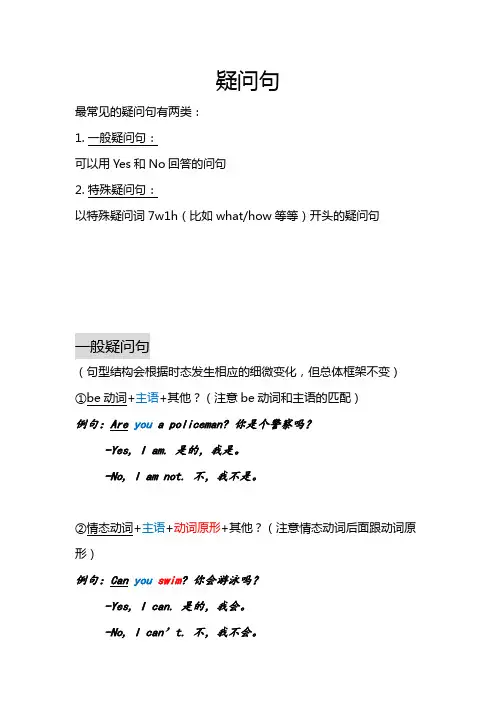
疑问句最常见的疑问句有两类:1.一般疑问句:可以用Yes和No回答的问句2.特殊疑问句:以特殊疑问词7w1h(比如what/how等等)开头的疑问句一般疑问句(句型结构会根据时态发生相应的细微变化,但总体框架不变)①be动词+主语+其他?(注意be动词和主语的匹配)例句:Are you a policeman? 你是个警察吗?-Yes, I am. 是的,我是。
-No, I am not. 不,我不是。
②情态动词+主语+动词原形+其他?(注意情态动词后面跟动词原形)例句:Can you swim? 你会游泳吗?-Yes, I can. 是的,我会。
-No, I can’t. 不,我不会。
③助动词+主语+动词原形+其他?(注意助动词和主语的匹配)例句:Do you like dancing? 你喜欢跳舞吗?-Yes, I do. 是的,我喜欢。
-No, I don’t. 不,我不喜欢。
Do you go to school every day? 你每天去学校吗?做句型转换的方法(如何将陈述句变成一般疑问句):先看句子中是否有be动词或者情态动词A.如果有be动词或者情态动词,对照一般疑问句句型①/②将be动词或者情态动词提到句首,其他部分依次照抄B.如果没有be动词或者情态动词,对照一般疑问句句型③句首+助动词(注意是否要和主语匹配变化),其他部分依次照抄,注意原来的动词要变为原形#无论是哪一种情况,都要注意第一人称要变成第二人称,第二人称要变成第一人称(you和I的切换)特殊疑问句(句型结构会根据时态发生相应的细微变化,但总体框架不变)①特殊疑问词(作主语)+谓语+其他?(陈述句语序)例句:Who is reading a book? 谁正在读书?Which is the biggest? 哪个是最大的?Who likes dancing? 谁喜欢跳舞?②特殊疑问词(作主语修饰语)+主语+谓语+其他?(陈述句语序)例句:Whose bag is red? 谁的包是红色的?How many people work in the school?有多少人在学校工作?③特殊疑问词+一般疑问句(详见上面的一般疑问句结构)?(此情况为当特殊疑问词代替的部分不是主语或者主语修饰语时)例句:What are you doing? 你在做什么?What colour do you like? 你喜欢什么颜色?做句型转换的方法(如何将句子转变成特殊疑问句):先看划线部分是否为句子中的主语或者主语修饰语A.如果是主语,对照特殊疑问句句型①划线部分用特殊疑问词代替,其他部分照抄(该疑问句为陈述句语序)B.如果是主语修饰语,对照特殊疑问句句型②划线部分用特殊疑问词代替,其他部分照抄(该疑问句为陈述句语序)C.如果不是主语或者主语修饰语,对照特殊疑问句句型③先将原来的陈述句变成一般疑问句(如果本来就是一般疑问句就不需要再做修改)划线部分用特殊疑问词代替再将特殊疑问词提前到句首#如果划线部分是动词或者动词短语,表示做什么事,那变为特殊疑问词的时候要用do what 代替特殊疑问词主要分为两类:wh- (wh开头的疑问词)和how - (how开头的疑问词)How often:多长时间一次,问频率。
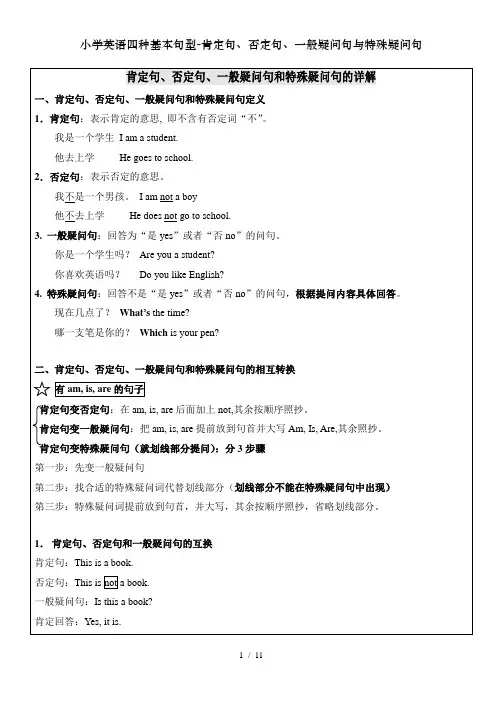
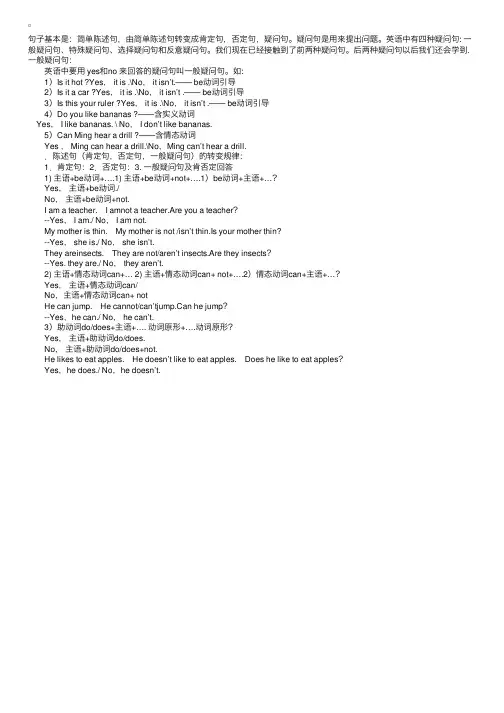
句⼦基本是:简单陈述句,由简单陈述句转变成肯定句,否定句,疑问句。
疑问句是⽤来提出问题。
英语中有四种疑问句: ⼀般疑问句、特殊疑问句、选择疑问句和反意疑问句。
我们现在已经接触到了前两种疑问句。
后两种疑问句以后我们还会学到.⼀般疑问句: 英语中要⽤ yes和no 来回答的疑问句叫⼀般疑问句。
如: 1)Is it hot ?Yes, it is .\No, it isn’t.—— be动词引导 2)Is it a car ?Yes, it is .\No, it isn’t .—— be动词引导 3)Is this your ruler ?Yes, it is .\No, it isn’t .—— be动词引导 4)Do you like bananas ?——含实义动词 Yes, I like bananas. \ No, I don’t like bananas. 5)Can Ming hear a drill ?——含情态动词 Yes , Ming can hear a drill.\No,Ming can’t hear a drill. .陈述句(肯定句,否定句,⼀般疑问句)的转变规律: 1.肯定句:2.否定句:3. ⼀般疑问句及肯否定回答 1) 主语+be动词+….1) 主语+be动词+not+….1)be动词+主语+…? Yes,主语+be动词./ No,主语+be动词+not. I am a teacher. I amnot a teacher.Are you a teacher? --Yes, I am./ No, I am not. My mother is thin. My mother is not /isn’t thin.Is your mother thin? --Yes, she is./ No, she isn’t. They areinsects. They are not/aren’t insects.Are they insects? --Yes. they are./ No, they aren’t. 2) 主语+情态动词can+… 2) 主语+情态动词can+ not+….2)情态动词can+主语+…? Yes,主语+情态动词can/ No,主语+情态动词can+ not He can jump. He cannot/can’tjump.Can he jump? --Yes,he can./ No, he can’t. 3)助动词do/does+主语+…. 动词原形+….动词原形? Yes,主语+助动词do/does. No,主语+助动词do/does+not. He likes to eat apples. He doesn’t like to eat apples. Does he like to eat apples? Yes,he does./ No,he doesn’t.。

一般疑问句与特殊疑问句01一般疑问句一般疑问句通常需要用yes 或no 来回答,所以又叫做“是非疑问句”。
在读这种句子时要用升调。
一般疑问句主要有以下几种类型:一、“be + 主语+ 表语”结构— Are you sleepy ? 你困了吗?— Yes, I am . 是的,我困了。
二、“情态动词+ 主语言+ 行为动词(或be)”结构— May/Can I use the telephone? 我能用这部电话吗?— Yes, you can. 是的,可以。
三、“助动词(do, does, did)+ 主语+ 行为动词”结构— Do you like swimming in summer? 你喜欢夏天游泳吗?— No, I don`t . 不,我不喜欢。
四、难点提示:回答否定性一般疑问句时,要在Yes 后面用肯定结构,表示肯定;在No 后面用否定结构,表示否定。
注意在说法上正好与汉语习惯相反。
诀窍是在回答的时候,只要把它当成没有加否定形式的普通一般疑问句看待就可以了。
注意下面例句的回答和它的意思。
— Is he not your elder brother? 他不是你的哥哥吗?—Yes, he is . 不,他是(我的哥哥)。
—No, he is not. 是的,他不是(我的哥哥)。
— Isn`t she very clever? 她难道不是很聪明吗?— Yes, she is. 不,她很聪明。
— No, she is not . 是,她不聪明。
02特殊疑问句一、特殊疑问句是用来提出来特定问题的疑问句,要求听到问题的人针对特定情况来做具体的回答,不能像一般疑问句一样简单地用Yes 或No 来回答,特殊疑问句要用降调来读。
二、特殊疑问句的结构:特殊疑问词+ 一般疑问句Who do English homework in the evening?谁晚上做英语家庭作业?What do you do in the evening?你晚上做什么?What homework do you do in the evening?你晚上做什么家庭作业?When do you do English homework?你什么时候做英语家庭作业?三、注意:对人提问时wh o“谁”对所属(谁的)提问用whose“谁的”对哪一个提问用which“哪一个”对时间提问用when“什么时候”或what time“几点”对物体提问用what“什么”对地点提问用where“哪里”对原因提问用why“为什么”对方式提问用how“怎么样”对数量提问用how many“多少”(用于可数名词复数)或how much“多少”(用于不可数名词)四、难点提示1、以why开头的特殊疑问句否定形式常用于表示建议、请求等。

一般疑问句和特殊疑问句知识点总结疑问句最常见的疑问句有两类:1.一般疑问句:可以用Yes和No回答的问句2.特殊疑问句:以特殊疑问词7w1h(比如what/how等等)开头的疑问句一般疑问句(句型结构会根据时态发生相应的细微变化,但总体框架不变)①be动词+主语+其他?(注意be动词和主语的匹配)例句:Areyoua policeman?你是个警察吗?-Yes, I am.是的,我是。
-No, I am not.不,我不是。
②情态动词+主语+动词原形+其他?(注意情态动词后面跟动词原形)例句:Canyouswim?你会游泳吗?-Yes, I can.是的,我会。
-No, I can’t.不,我不会。
③助动词+主语+动词原形+其他?(注意助动词和主语的匹配)例句:Doyoulikedancing?你喜欢跳舞吗?-Yes, I do.是的,我喜爱。
-No, I don’t.不,我不喜欢。
Doyougoto school every day?你每天去学校吗?做句型转换的方法(如何将陈述句变成一般疑问句):先看句子中是否有be动词或者情态动词A.如果有be动词或者情态动词,对照一般疑问句句型①/②将be动词或者情态动词提到句首,其他局部依次照抄B.如果没有be动词或者情态动词,对照一般疑问句句型③句首+助动词(注意是不是要和主语婚配变化),其他局部依次照抄,注意原来的动词要变为真相#无论是哪种情况,都要注意第一人称要酿成第二人称,第二人称要酿成第一人称(you和I的切换)非凡疑问句(句型结构会根据时态发生相应的细微变化,但总体框架不变)①特殊疑问词(作主语)+谓语+其他?(陈述句语序)例句:Whois reading a book?谁正在读书?Whichis the biggest?哪个是最大的?Wholikes dancing?谁喜爱跳舞?②非凡疑问词(作主语修饰语)+主语+谓语+其他?(陈说句语序)例句:Whosebagis red?谁的包是红色的?How manypeoplework in the school?有多少人在学校工作?③特殊疑问词+一般疑问句(详见上面的一般疑问句结构)?(此情况为当特殊疑问词代替的部分不是主语或者主语修饰语时)例句:What areyoudoing?你在做什么?What colour doyoulike?你喜欢什么颜色?做句型转换的方法(如何将句子转变成特殊疑问句):先看划线局部是不是为句子中的主语或者主语修饰语A.如果是主语,对照非凡疑问句句型①划线部分用特殊疑问词代替,其他部分照抄(该疑问句为陈述句语序)B.如果是主语修饰语,对照特殊疑问句句型②划线部分用特殊疑问词代替,其他部分照抄(该疑问句为陈述句语序)C.如果不是主语或者主语修饰语,对照特殊疑问句句型③先将原来的陈述句变成一般疑问句(如果本来就是一般疑问句就不需要再做修改)划线局部用非凡疑问词替代再将特殊疑问词提前到句首#如果划线局部是动词或者动词短语,表示做什么事,那变为非凡疑问词的时候要用do what替代非凡疑问词主要分为两类:wh-(wh开头的疑问词)和how - (how开头的疑问词)疑问词whatwhowhosewhichwherewhenwhywhat for what colour what day what date what time 含义什么谁谁的哪一个在哪里什么时候为什么为什么什么颜色星期几什么日期几点钟用法问东西问人问归属问挑选问地址问时间问原因。
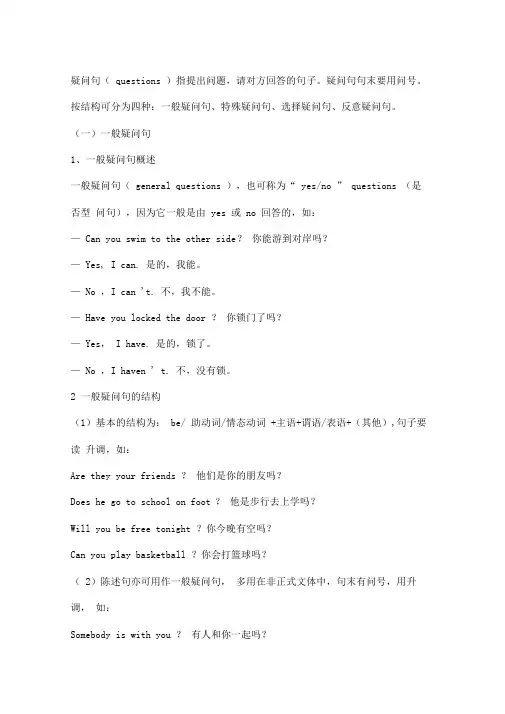
疑问句( questions )指提出问题,请对方回答的句子。
疑问句句末要用问号。
按结构可分为四种:一般疑问句、特殊疑问句、选择疑问句、反意疑问句。
(一)一般疑问句1、一般疑问句概述一般疑问句( general questions ),也可称为“ yes/no ” questions (是否型问句),因为它一般是由 yes 或 no 回答的,如:— Can you swim to the other side ?你能游到对岸吗?— Yes, I can. 是的,我能。
— No ,I can 't. 不,我不能。
— Have you locked the door ?你锁门了吗?— Yes, I have. 是的,锁了。
— No ,I haven ' t. 不,没有锁。
2 一般疑问句的结构(1)基本的结构为: be/ 助动词/情态动词 +主语+谓语/表语+(其他),句子要读升调,如:Are they your friends ?他们是你的朋友吗?Does he go to school on foot ?他是步行去上学吗?Will you be free tonight ?你今晚有空吗?Can you play basketball ?你会打篮球吗?( 2)陈述句亦可用作一般疑问句,多用在非正式文体中,句末有问号,用升调,如:Somebody is with you ?有人和你一起吗?He didn ' t finish the work ?他没有做完活吗?You are fresh from America , I suppose ?我猜,你刚从美国回来吧?3、一般疑问句的答语( 1)一般疑问句一般由 yes 或 no 来回答,如:— Are you tired ?你累了吗?— Yes,I am. 是的 ,累了。
— No, I ' m not. 不,不累。
— Does she do the cleaning ?她扫除了吗?— Yes , she does. 是的,她打扫了。
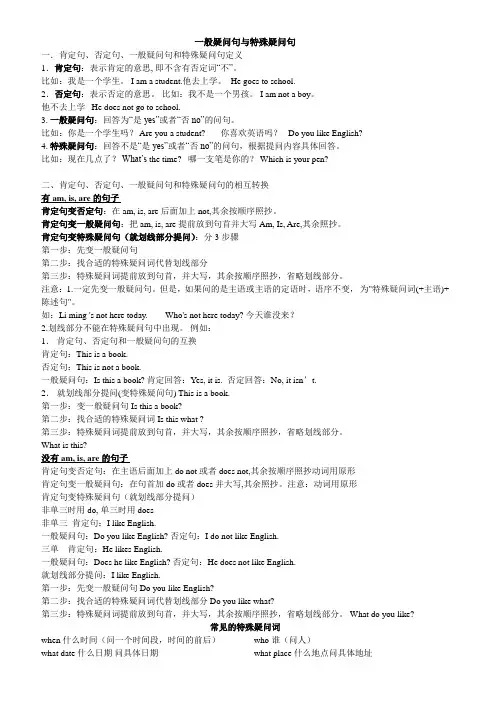
一般疑问句与特殊疑问句一.肯定句、否定句、一般疑问句和特殊疑问句定义1.肯定句:表示肯定的意思, 即不含有否定词“不”。
比如:我是一个学生。
I am a student.他去上学。
He goes to school.2.否定句:表示否定的意思。
比如:我不是一个男孩。
I am not a boy。
他不去上学 He does not go to school.3. 一般疑问句:回答为“是yes”或者“否no”的问句。
比如:你是一个学生吗? Are you a student? 你喜欢英语吗? Do you like English?4. 特殊疑问句:回答不是“是yes”或者“否no”的问句,根据提问内容具体回答。
比如:现在几点了?What’s the time? 哪一支笔是你的? Which is your pen?二、肯定句、否定句、一般疑问句和特殊疑问句的相互转换有am, is, are的句子肯定句变否定句:在am, is, are后面加上not,其余按顺序照抄。
肯定句变一般疑问句:把am, is, are提前放到句首并大写Am, Is, Are,其余照抄。
肯定句变特殊疑问句(就划线部分提问):分3步骤第一步:先变一般疑问句第二步:找合适的特殊疑问词代替划线部分第三步:特殊疑问词提前放到句首,并大写,其余按顺序照抄,省略划线部分。
注意:1.一定先变一般疑问句。
但是,如果问的是主语或主语的定语时,语序不变,为"特殊疑问词(+主语)+陈述句"。
如:Li ming 's not here today. Who's not here today? 今天谁没来?2.划线部分不能在特殊疑问句中出现。
例如:1.肯定句、否定句和一般疑问句的互换肯定句:This is a book.否定句:This is not a book.一般疑问句:Is this a book? 肯定回答:Yes, it is. 否定回答:No, it isn’t.2.就划线部分提问(变特殊疑问句) This is a book.第一步:变一般疑问句 Is this a book?第二步:找合适的特殊疑问词 Is this what ?第三步:特殊疑问词提前放到句首,并大写,其余按顺序照抄,省略划线部分。

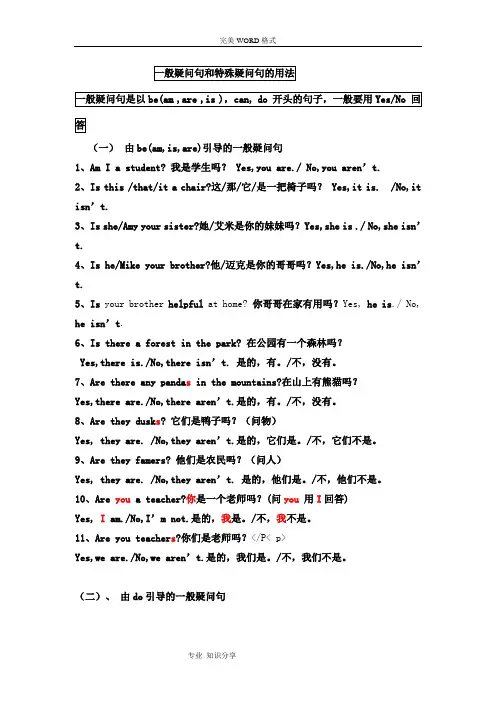
(一)由be(am,is,are)引导的一般疑问句1、Am I a student? 我是学生吗? Yes,you are./ No,you aren’t.2、Is this /that/it a chair?这/那/它/是一把椅子吗? Yes,it is. /No,it isn’t.3、Is she/Amy your sister?她/艾米是你的妹妹吗?Yes,she is ./ No,she isn’t.4、Is he/Mike your brother?他/迈克是你的哥哥吗?Yes,he is./No,he isn’t.5、Is your brother helpful at home? 你哥哥在家有用吗?Yes, he is./ No, he isn’t.6、Is there a forest in the park? 在公园有一个森林吗?Yes,there is./No,there isn’t. 是的,有。
/不,没有。
7、Are there any panda s in the mountains?在山上有熊猫吗?Yes,there are./No,there aren’t.是的,有。
/不,没有。
8、Are they dusk s? 它们是鸭子吗?(问物)Yes, they are. /No,they aren’t.是的,它们是。
/不,它们不是。
9、Are they famers? 他们是农民吗?(问人)Yes, they are. /No,they aren’t. 是的,他们是。
/不,他们不是。
10、Are you a teacher?你是一个老师吗?(问you 用I回答)Yes, I am./No,I’m not.是的,我是。
/不,我不是。
11、Are you teacher s?你们是老师吗?</P< p>Yes,we are./No,we aren’t.是的,我们是。


一般疑问句、特殊疑问句的构成形式及基本用法1. 一般疑问句:一般疑问句一般是指以助动词、情态动词、be动词或have(有)开始,通常要求以yes,或no来回答的疑问句,一般疑问句读时通常用升调。
Do you know Mr. Smith?Can you swim?2. 特殊疑问句特殊疑问句由“疑问代词或疑问副词+一般疑问句”构成,句子一般用倒装语序,但如果主语是疑问代词或由疑问代词修饰时,用陈述句的语序。
特殊疑问句不能用yes或no回答,读时用降调。
例如:Who is on duty today?How long have you been in Beijing? What time do you get up every morning?What must I do now?3. 注意疑问词的选择1. 问“谁”用who或whom。
如:Who is a doctor?Li Lei is a doctor.(对主语提问用who,对宾语提问用who,whom均可)2. 问“谁的”用whose。
如:Whose book is this?This is his book.3. 问“地点”用where。
如:Where is the ball?The ball is under the bed.4. 问“原因”用why。
如:Why didn't he come?He didn't come because he was ill.5. 问“身体状况”用how。
如:How are you?I'm fine.6. 问“方式”用how。
如:How did he do it?He did it in that way.7. 问“程度”用“how +被修饰语”。
如:How wide is the river?The river is five metres wide.8. 问“多少”用how much或how many。
四年级-⼀般疑问句和特殊疑问句⼀般疑问句和特殊疑问句【⼀般疑问句】⼀、什么是⼀般疑问句?答:能⽤yes / no(或相当于yes / no)回答的问句叫⼀般疑问句。
如何将陈述句变为⼀般疑问句1、第⼀家族:含be动词或情态动词的句⼦秘诀:⼀调⼆改三问号⼀调:即把句中的be或情态动词调到主语前;⼆改:改换主语称谓,即将句中的主语I\my \mines\we\our\ours等第⼀⼈称分别改为相应的第⼆⼈称you\your\ yours等;三问号:句末的句号改为问号。
如:. I am an English teacher. → Are you an English teacher?. We can speak English fluently. → Can you speak English fluently?2、第⼆家族:含⾏为动词(或称为实义动词)的句⼦秘诀:⼀加⼆改三问号⼀加:即在句⾸加助动词Do或Does;⼆改:1、把谓语动词改为原形;2、改换主语称谓(同第⼀家组);三问号:句末的句号改为问号。
. We read English every morning. → Do you read English every morning?. Tom’s father listens to English on the radio every evening. →Does Tom’s father listen to English on the radio every evening?特别注意:对于第⼆家族⼀定要注意动词的还原,因为时态与数的变化已经体现在助动词上了。
3、加强记忆⼝诀:“肯变⼀,并不难,can 或be提在前;谓语若为⾏为动,do 或does句⾸⽤。
”六、“some”还是“any”?在⼀般疑问句中,要表达“⼀些”时,⼀般⽤any,但如果这个问句是⽤来表达“建议、请求、邀请”等交际功能时,应该some. Is there any tea in the cup?. Do you have any children?. May I have some fish?Would you like some tea?Shall we buy some vegetables?Can I borrow some money from you?Why not have some bread?How about some orange juice?练练吧⼀、改为⼀般疑问句1. I can skate well. __________ __________skate well?2. Kate does morning exercises every day.________ Kate________ morning exercises every day?3. The exam begins at nine. __________ the exam__________ at nine?4. Ann returned the book to the library yesterday._______ Ann_______ the book to the library yesterday?5. There's something to eat in the cupboard.__________ there__________ to eat in the cupboard?6. Mary likes scuba diving very much._________ Mary_________ scuba diving very much?⼆、⽤ is, are, am ,do, did ,does ,can 填空,然后变成⼀般疑问句1. His father ____an English teacher.2. These children_____ crying.3. They______swim.4. ______ you like reading English? Yes, I like reading English.5. How _____you go to school? I go to school on foot.6. What _____he like? He likes English.7. _____ his father go to work by bus? No, his father rides a bike to work.8. ______ your father read newspaper last night? No, he read a story book.9.I ____ a teacher.⼀般疑问句10. He ____ a doctor.⼀般疑问句11.You _____ good workers.⼀般疑问句12.______ (它是) an apple.⼀般疑问句13.They _____ workers.⼀般疑问句14.I _____ three books.⼀般疑问句He ____ many trees.⼀般疑问句I can speak English.⼀般疑问句They can swim.⼀般疑问句Shall he call you tonight?陈述句I need finish my work.⼀般疑问句【特殊疑问句】特殊疑问句要由疑问代词或疑问副词开头,询问的内容不同, 使⽤的疑问词也不同。
人教版小学四年级英语下册一般疑问句和特殊疑问句知识精讲Document serial number【UU89WT-UU98YT-UU8CB-UUUT-UUT108】PEP小学四年级英语下册《一般疑问句和特殊疑问句知识精讲》(一)疑问句可再分为一般疑问和特殊疑问两种。
(一).一般疑问:用be或助动词或情态动词置于句首,并以肯定回答“Yes,…”,或否定回答“No,…”或相当于yes / no回答的问句称为一般疑问句.1. 含系动词be的一般疑问句的构成具体地说,am 只能跟在第一人称的单数 I 后面,are 搭配 you ,we ,they等, ,is 跟在第三人称单数 he, she ,it后面,而be 动词的基本意思:是如:This is my computer. →Is this your computer (如遇第一人称,最好将其置换成第二人称,即将“我的”要换成“你的”) It's a map. →Is it a map而对于一般疑问句和特殊疑问句的回答分为两种,即肯定回答和否定回答。
如:Is it your bike肯定回答:Yes, it is.否定回答:No, it isn’t.Are they your shoes肯定回答:Yes, they are.否定回答:No, they are n’t.2.含助动词Do或Does的一般疑问句的构成Do与you,I,we连用,Does与he,she和it连用。
如:Do you have lunch at school肯定回答:Yes, I do.否定回答:No, I don’t.3. 含情态动词的一般疑问句的构成一般疑问句面前人人平等:情态动词与am / is / are一样,也可直接将它们提至主语前,所以问题迎刃而解了。
如:I can do it. →Can you do it肯定回答:Yes,I can.否定回答:No, I can’t.(记住在改成一般疑问句时应该将第一人称改成第二人称)Can I wear my new shirt today肯定回答:Yes,you can.否定回答:No, you can’t.4. 小插曲:一般疑问句的语调大部分的一般疑问句都应读作升调(↗),并落在最后一个单词身上。
小学英语一般疑问句和特殊疑问句(附练习题)一、一般疑问句一般疑问句是需要用Yes或No作答的疑问句。
它的特点是以be动词、助动词或情态动词开头,并且往往读升调。
要将陈述句变成一般疑问句,有两种方法。
如果陈述句中有be动词或情态动词,就将它们提到句首,句末加上问号即可。
如果句中没有这些动词,就在句首加上do的相应形式,并将原句的谓语动词变回原形。
需要注意的是,如果陈述句中有第一人称,变成疑问句时要变为第二人称。
而如果陈述句中有some,变成疑问句时往往要变成any。
回答一般疑问句时,如果问句主语是this或that,就用it代替;如果问句主语是these或those,就用they代替。
例如,如果问句是“Does she clean her room every day?”,回答可以是“Yes。
she does.”如果问句是“Is this your book?”,回答可以是“Yes。
it is.”1._______ is your favorite color?2._______ did you go on n?3._______ is your birthday?4._______ is your best friend?答案:1.What2.Where3.When4.Who二、改写句子1.His XXX.What was his father's job?2.XXX.Why are these cats crying?3.They can swim.What can they do?4.I went to school on foot.How did you go to school?5.His father goes to work by bus.How does his father go to work?6.Mrs。
Li and Kitty XXX.What can Mrs。
Li and Kitty do?7.Kitty is XXX.What is Kitty wearing?8.The two boys under the tree were hungry. Who was hungry under the tree?9.Mrs。
一般疑问句与特殊疑问句(1)★★★口诀:“我用am,你用are,is用于他/她/它,复数都用are.”(be 动词的用法)一.含be 动词(am /is / are)的一般疑问句:把am /is / are提前,末尾句号“。
”→问号“?”。
注意:第一人称→第二人称。
1)否定句:在be动词后+ “not”.2)含be 动词的一般疑问句的回答:→Yes, he / she / it is . →No, he /she it is not.→Yes, we / you / they are . →No, we /you /they are not.→Yes, I am. →No, I am not.3)含be 动词的特殊疑问句:特殊疑问词+ be 动词+ 其他(特殊疑问词+ 一般疑问句)4). 特殊疑问词:where哪里(对地点提问);who谁(对人提问);what什么(对性质提问);why 为什么(对原因提问);when 什么时候(对时间提问);what time几点(对具体时间提问); how 怎么样(对方式提问);how old多大(对年龄提问);how long多长/多久;how far多远(对距离提问);what color什么颜色(对颜色提问);how often多少次(对频率提问);how much 多少(对价格/不可数n.数量提问);how many多少(对可数n.提问);which哪个(对选项提问)…5)eg:He is from Japan. 他来自日本。
(变一般疑问句和特殊疑问句/对划线部分提问)否定句:he is not from Japan.他不是来自日本.(be 动词后+ not)一般疑问句:Is he from Japan? 他来自日本吗?(把be 动词“is”提前)特殊疑问句:Where is he from? 他来自哪里?(特殊疑问词+ 一般疑问句)1)We _____ from China.我们来自中国。
一般疑问句和特殊疑问句【一般疑问句】一、什么是一般疑问句?答:能用yes / no(或相当于yes / no)回答的问句叫一般疑问句。
如何将陈述句变为一般疑问句1、第一家族:含be动词或情态动词的句子秘诀:一调二改三问号一调:即把句中的be或情态动词调到主语前;二改:改换主语称谓,即将句中的主语I\my \mines\we\our\ours等第一人称分别改为相应的第二人称you\your\ yours等;三问号:句末的句号改为问号。
如:. I am an English teacher. → Are you an English teacher?. We can speak English fluently. → Can you speak English fluently?2、第二家族:含行为动词(或称为实义动词)的句子秘诀:一加二改三问号一加:即在句首加助动词Do或Does;二改:1、把谓语动词改为原形;2、改换主语称谓(同第一家组);三问号:句末的句号改为问号。
. We read English every morning. → Do you read English every morning?. Tom’s father listens to English on the radio every evening. →Does Tom’s father listen to English on the radio every evening?特别注意:对于第二家族一定要注意动词的还原,因为时态与数的变化已经体现在助动词上了。
3、加强记忆口诀:“肯变一,并不难,can 或be提在前;谓语若为行为动,do 或does句首用。
”六、“some”还是“any”?在一般疑问句中,要表达“一些”时,一般用any,但如果这个问句是用来表达“建议、请求、邀请”等交际功能时,应该some.Is there any tea in the cup?. Do you have any children?. May I have some fish?Would you like some tea?Shall we buy some vegetables?Can I borrow some money from you?Why not have some bread?How about some orange juice?练练吧一、改为一般疑问句1. I can skate well. __________ __________skate well?2. Kate does morning exercises every day.________ Kate________ morning exercises every day?3. The exam begins at nine. __________ the exam__________ at nine?4. Ann returned the book to the library yesterday._______ Ann_______ the book to the library yesterday?5. There's something to eat in the cupboard.__________ there__________ to eat in the cupboard?6. Mary likes scuba diving very much._________ Mary_________ scuba diving very much?二、用 is, are, am ,do, did ,does ,can 填空,然后变成一般疑问句1. His father ____an English teacher.2. These children_____ crying.3. They______swim.4. ______ you like reading English? Yes, I like reading English.5. How _____you go to school? I go to school on foot.6. What _____he like? He likes English.7. _____ his father go to work by bus? No, his father rides a bike to work.8. ______ your father read newspaper last night? No, he read a story book.9.I ____ a teacher.一般疑问句10. He ____ a doctor.一般疑问句11.You _____ good workers.一般疑问句12.______ (它是) an apple.一般疑问句13.They _____ workers.一般疑问句14.I _____ three books.一般疑问句He ____ many trees.一般疑问句I can speak English.一般疑问句They can swim.一般疑问句Shall he call you tonight?陈述句I need finish my work.一般疑问句【特殊疑问句】特殊疑问句要由疑问代词或疑问副词开头,询问的内容不同, 使用的疑问词也不同。
我们学过的疑问词有特殊疑问词有:what(什么) what colour(什么颜色) what time(几点) what day(星期几)how(怎样) how old(多大、几岁) how many(多少) who(谁) how much (多少钱)when(什么时候) whose (谁的) where(在哪里) why(为什么) which(哪一个)what(询问事物), how much(询问价格), what time (询问时间,尤其是点钟), what kind of(询问种类), why(询问原因),who(询问人), where(询问地点)等等。
如:特殊疑问句:以特殊疑问词开头,对句中某一成分提问的句子。
常用的疑问词有:what who whose which when where how why等。
可先分为3种:疑问代词:what,who,which,whose,whom疑问副词:when,where,why,how疑问形容词:what(which,whose)+名词特殊疑问句有两种语序1.如疑问词作主语或主语的定语,即对主语或主语的定语提问,其语序是陈述句的语序:疑问词(+主语)+谓语动词+其他成分。
如:Who is singing in the room? whose bike is broken?2.如疑问词作其他成分,即对其他成分提问,其语序是:疑问词+一般疑问句语序?如:What class are you in?What does she look like?Where are you from?What time does he get up every morning?注意:回答特殊疑问句时,不能用yes / no,即问什么答什么,尤其是简略回答。
如:Who is from Canada? Helen (is).Where's the restaurant? Near the station.Why do you like koalas? Because they are cute.特殊疑问句练习题一、选择正确的单词填空 (who, where, when)1._____ is that pretty girl? She is my sister.2._____ are Jack and Tom? They are behind you.3._____ do you go to school? I go to school from Monday to Friday.4._____ has a beautiful flower? John has a beautiful flower.5._____ are they? They are my parents.6._____ is my mother? She is in the living room.7._____ are you going? We are going to the bakery(面包坊).8._____ do Jim and Wendy play ball? They play ball in the afternoon.9._____ does he jog? He jogs in the park.10._____ are you from? I'm from Changchun city.二、就画线部分提问1.He is my father._______________________________________________2.They are under the tree._______________________________________________3.I often watch TV after dinner.(晚饭后)_______________________________________________4.Lily swims in the swimming pool.(游泳池)_______________________________________________5.Superman flies in the sky.________________________________________________6.I often brush my teeth in the evening.________________________________________________7.Alan likes to play with Bill.________________________________________________8.Joe's father plays badminton(羽毛球) every weekend.________________________________________________9.The supermarket is near the school._________________________________________________10.The laptop(笔记本电脑) is on the table._________________________________________________三.用what time, what color, what day, what填空。